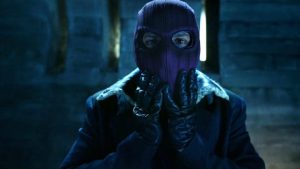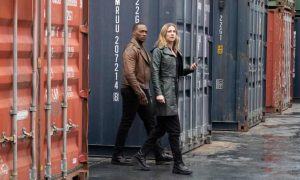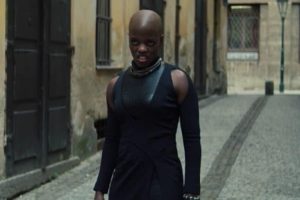SPOILERS FOR THE FALCON AND THE WINTER SOLDIER AHEAD!
And…here we go again. Another week, another episode of The Falcon And The Winter Soldier, another round of unbearable Twitter discourse about the white people in this show while the Black lead continues to be, at best, overshadowed, and at worst, actively undermined, by this very type of discourse. And this week’s episode didn’t even center on Sam Wilson as much as it could have with better writing, but it focused even less on Bucky Barnes – and yet the new discourse predictably revolves around the latter.

This week, it’s actor/director Stephen Ford who failed the “try-to-have-a-meaningful-conversation-about-The-Falcon-And-The-Winter-Soldier-without-constantly-centering-whiteness” challenge. While most of us were acknowledging the sheer awesomeness of the Dora Milaje warriors, and getting even more hyped about the upcoming Wakanda Disney+ series that will surely explore their adventures and inspiring teamwork, Ford took to Twitter to share his own deeply cringeworthy take on one of the best scenes in the series (and by far the best action sequence), in which Ayo and the Dora Milaje battle Sam Wilson, Bucky Barnes, John Walker, and Lemar Hoskins.
In a matter of minutes, the Dora Milaje have soundly defeated all four men – and only fail in their ultimate goal to capture Baron Zemo because Sam and Bucky insisted on getting involved in the fight to protect John Walker’s fragile ego, allowing the Baron to escape in the chaos. Sam almost holds his own, but Ayo makes short work of Bucky, swiftly and decisively activating what is implied to be a secret failsafe built into his Wakandan-made vibranium arm, causing the appendage to simply pop off.
https://twitter.com/StephenSeanFord/status/1381414562046468097
The moment is shocking, and is clearly supposed to provoke an emotional reaction from the viewer – but if your takeaway is that the Wakandans are “really messed up” manipulative monsters who violated Bucky’s bodily autonomy, then I encourage you to rewatch the scene: and this time, not through the filter of whiteness. Because the entire sequence is far more complex and nuanced than that, and exemplifies everything I love most about The Falcon And The Winter Soldier‘s masterful way of tackling very serious topics.
Ford’s argument, which I had already seen being voiced by melodramatic Bucky stans before he posted his tweet, is that Bucky was betrayed by the Wakandans who designed the failsafe in his arm, and that it’s indicative of the way nobody in his life – even those he believes to be friends or allies – actually trust him to have changed or evolved since his time as the brainwashed HYDRA killing-machine known as the Winter Soldier. But for a deep-dive psychological analysis into an already iconic pop-culture moment, it’s embarrassingly shallow, ignoring several crucial bits of context that lend a wholly different meaning to the scene when taken into account.
Firstly, how about we actually talk about why the Dora Milaje were there? They had been dispatched from Wakanda to find Baron Zemo and bring him to justice for assassinating their King T’Chaka – a violent killing that, need I remind you all, Zemo carried out while disguised as Bucky in an attempt to have the Winter Soldier taken captive, thus making him easier for Zemo to later access and brainwash. And yet, when the Dora Milaje arrive in Riga, they find Bucky now willingly aiding and abetting Zemo – something that has to hurt them all, after what they did to help Bucky heal and recover from Zemo’s manipulation.
And sure, you could argue that Bucky had a valid reason for breaking Zemo out of prison and following him halfway around the world…but at the same time, it is deeply troubling that Bucky hasn’t once mentioned what he planned to do with Zemo after he and Sam had gotten the information they needed from the killer. At this point, anything remotely resembling a plan has now gone out the window (or, rather, the sewer tunnel), thanks to Zemo’s escape: but the Dora Milaje are validated in their distrust of Bucky, because all he’s done is call Zemo “a means to an end”, as if that makes his actions more ethical, without explaining whether he ever intended to hand Zemo over to the Wakandans, or back to the German authorities.

Secondly, let’s talk about the arm in question for a moment, shall we? Designed by the Wakandans out of vibranium, their nation’s most rare, precious, and frequently stolen resource, the fact that that arm even exists is proof that Wakanda trusted Bucky enough not to go on a homicidal rampage strangling people to death, as is the fact that Ayo leaves the arm with Bucky after their battle instead of taking it with her. But…that arm is still a weapon; a dangerous and potentially very destructive weapon.
And Ayo, by activating the failsafe in the arm, isn’t telling Bucky she distrusts him. She’s reminding him – without even having to say a word, though she does throw in a whispered “Bast damn you, James” for good measure – that Wakanda did trust him, that they made the choice to weaponize him believing he had changed, and that he betrayed that trust: not by devolving into the Winter Soldier again, not by going on a murder spree or anything like that, but by having the audacity to defend Zemo after everything he did to hurt the people who helped Bucky escape him in the first place.
There’s a reason society overemphasizes the virtue of trust – because whiteness relies on people putting their total, unwavering, trust in fundamentally corrupt individuals and systems which are then free to exploit, abuse, and weaponize that trust against people of color, and particularly Black people. Unconditional trust is extremely dangerous, and if you want a good example, look no further than American nationalism, which is horrifically embodied in The Falcon And The Winter Soldier by John Walker. The entire show is about this idea of unconditional trust being the weapon of the oppressor, and about how Black people specifically have known this for a very long time.
So no, the Wakandans not putting total trust in Bucky isn’t a fault of theirs. It’s a defense mechanism – just like the literal failsafe they built into his arm. It’s not monstrous, it’s not manipulative, and it’s not messed up.

You know what is? That every week, the discourse that comes out of The Falcon And The Winter Soldier immediately centers whiteness and white characters in a story that is all about the dangers of doing just that. But with two episodes left and two more weeks of what will have to be some extraordinarily bad “hot takes” in order to top this one, I hope I can use my blog responsibly to help fight this trend.





